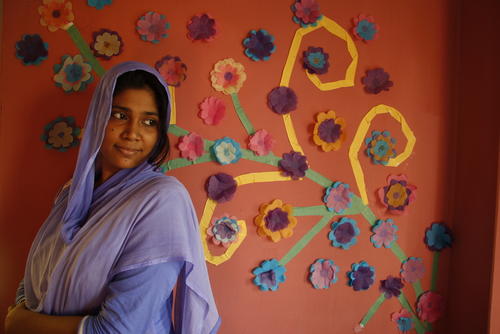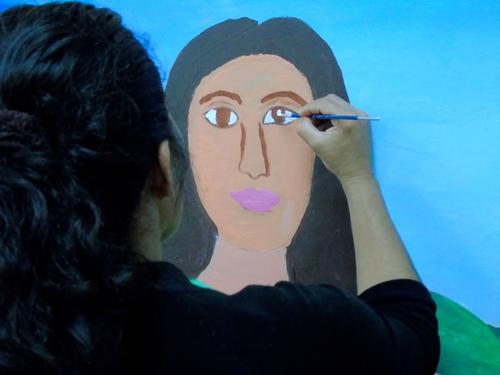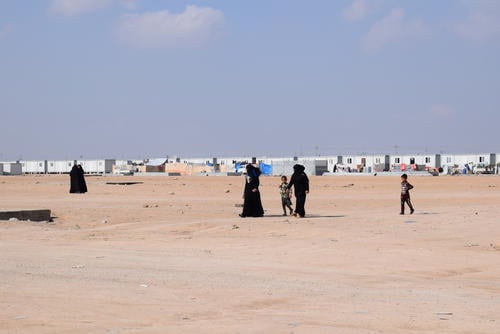“Before, I had no courage to help other women because I was afraid of my husband,” says Saliha, speaking rapidly in the afternoon heat. “But now, I have overcome all of my fears and anxieties.”
Saliha is a patient at MSF’s women’s health clinic in Kamrangirchar, a densely populated slum in the south of Dhaka, the capital of Bangladesh.
In three brightly painted rooms, the team there supports women like Saliha, survivors of sexual or gender-based violence. While this can include victims of sexual assaults committed by strangers, in Kamrangirchar it primarily means women who have been abused at home, by their husbands or another family member.
Saliha has survived abuse first from her father and then from her husband. She is, in some ways, typical of the women who come to the clinic.
“We see lots of cases where young women are being abused by their intimate partner and other family members, and it makes them really at risk of developing mental health disorders,” explained Mitu, a psychologist at the clinic. “They develop depression, anxiety and sometimes there’s a really high risk of suicide.”
The violence had a devastating effect on Saliha’s mental health. "He used to throw me out of the house whenever he was angry. I was constantly being beaten and verbally abused," she explains. "Afterwards, I would take sleeping pills, or cut my hand, or try to hang myself. I couldn’t tell my parents about that because this was my marriage."
For many women, it is not only the physical violence they face that has an impact on their mental health. Although she'd been a good student, Saliha’s husband pressurised her to stop going to school and to have a baby ("I thought that he might change after the birth," says Saliha. He beat her while she was pregnant).
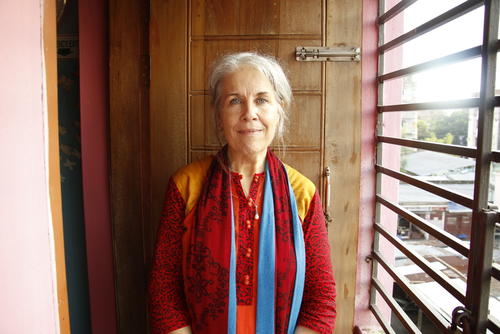
Beyond sexual or physical abuse
Family members can also play a role. Saliha's mother-in-law never approved of the marriage and made Saliha go hungry by hiding the family's food from her.
As Saliha's experience shows, intimate partner violence goes beyond sexual or physical behaviour. It can include all kinds of abusive behaviour, including emotional abuse, controlling behaviour, coercion and financial abuse.
A large-scale survey of Bangladeshi women found that 72% had experienced some form of intimate partner violence in the past 12 months. And in a survey of Bangladeshi men, 61% strongly agreed with the statement, “there are times when a woman deserves to be beaten.”
But, despite the prevalence and severity of the problem, it’s not widely discussed. Seventy-three percent of women surveyed in Bangladesh who had experienced abuse reported that they kept it secret, telling no one what they’d been through. Leah, one of the clinic’s team of passionate, committed counsellors, explained some of the reasons why:
“They do not know that this is a type of abuse. They think it is the husband’s right to beat them – that beating them is his moral right. Especially in Kamrangirchar, there are a lot of rapes committed by husbands, but our patients are not ready to accept that the husband can rape them too. They do not understand that they are abused.”
Learning to cope
There are also very limited options for women in abusive relationships. Most don’t have the money to live independently, and families may not have the funds to support them. Even when money isn’t an issue, the stigma of being a divorced woman in Bangladesh is immense, and can make basic things like renting somewhere to live challenging. The lack of options leaves many women stuck in violent relationships, often isolated and struggling to cope.
“I’ve had people ask, 'well what can we do?’," says Cindy, the mental health officer for the project. "It’s not going to change, so why are you providing services if your patients just go back to the same situation over and over again?”
But for women like Saliha, counselling can be transformative.
"Now my mental trauma is gone," says Saliha. "After coming to the clinic, I got the courage to overcome this day-to-day fight. I learnt how to deal with my husband’s abuse."
While they may experience continuing violence at home, counselling gives these women a space to talk, to make sense of their experiences and to discuss safety plans. “How to live better physically and mentally with these problems,” as Fatima, one of the counselling team, succinctly puts it.
This in itself can make women safer, Mitu explains. Depression and anxiety can put them at higher risk of violence because "they may be keeping themselves away from daily life, not functioning, leading to more problems with their family life."
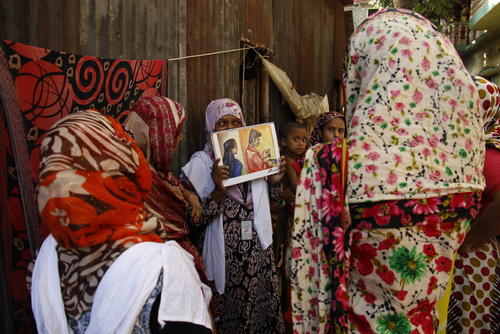
Counselling that helps women re-engage with their families not only keeps them safer, but is also better for their children.
“Unfortunately, when mums are stressed by violence from their partner, they often become abusive to the children,” explains Cindy. “Studies have shown that growing up in violent households is devastating for children’s development: they can’t focus in school, they become aggressive and suffer the same as if they were being abused directly. So these children are the next generation of traumatised family members who are more likely to go on and repeat these patterns.”
“It was so painful,” Saliha says, thinking of how her husband would beat her in front of their little girl. “I was thinking she is so young. When she grows up, what will she have learnt? What I faced in my childhood, will she grow up in the same situation as me? I do not want my child to grow up in this atmosphere."
The team in Kamrangirchar hope to expand the counselling service to offer sessions specifically designed to meet the needs of children growing up in violent households. In the meantime, they continue to reach out to the most vulnerable. As well as counselling services, the clinic offers medical care for new and expectant mothers – targeting their services to women aged under 25. As the slight figures in the waiting room show, many are much younger.
As patients wait for their appointments, the counsellors take advantage of the captive audience. Using a laminated set of brightly painted pictures, Leah talks to the women and girls about early marriage, mental health and intimate partner violence. Shy at first, they are soon engaged, calling out the answers to Leah's questions. In their medical appointments, they will be asked about the situation at home, and offered a referral for counselling if they need one.
Changing community attitudes
So far this year over 600 women with experience of intimate partner violence have begun counselling in Kamrangirchar. The team is working hard to educate the community, and spread the message about the services that are available. Payel, the information, communication and education officer, sees changing people's attitudes as her biggest challenge.
"Often women think they deserved it because the perpetrators make them feel like that. It’s your fault I beat you. It's your fault I behaved like that. To break that notion is really difficult. We think it will take a long time to remove these things. But we are trying to come up with different strategies to break this and we are really hopeful one day we’ll do it."
Saliha is also hopeful.
“In Bangladesh, ladies or wives used to say, where will we go? We can’t go back to our parents, so we have to tolerate this torture. My opinion is completely different. Women have the power to fight back. Why should they tolerate their husband’s tyranny and oppression? Why are they not coming out from this situation?
It is very important to change women’s mind sets. Women need to come forward and show their power to men."



